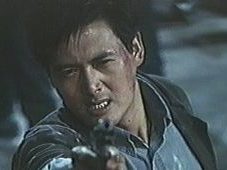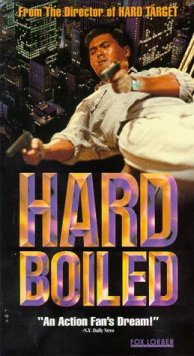
 Hard Boiled (1992)
Hard Boiled (1992)
Starring Chow Yun-Fat, Tony Leung, Philip Chan, Anthony Wong, Kwan Hoi-Shan,
Teresa Mo.
Written by Barry Wong and John Woo.
Directed by John Woo.
Grade: B+
Review by Carlo Cavagna.
Hard Boiled is not the best of John Woo's Hong Kong crime movies (that honor goes to The Killer), but it is certainly a superior film. Hard Boiled is also somewhat different from the others. While Woo's other Hong Kong movies also feature spectacularly melodramatic crime stories centered around flawed men trying to live their lives honorably, Hard Boiled is less optimistic and more brooding than movies like The Killer and A Better Tomorrow.
Chow Yun-Fat plays a maverick, moody, Mel Gibson-like cop nicknamed "Tequila." He is determined to bring down Hong Kong's ruthless gangs of illegal arms traders, and will take incredible risks and go against the wishes of his boss (Philip Chan) to do so. The only time we ever see Tequila deriving any enjoyment from life is when he plays his clarinet in a jazz nightclub, and even then, the songs are melancholy. Meanwhile, his boss is running an illegal undercover operation, in which a cop named Tony (Tony Leung) has become a highly regarded hit man. As a hit man, Tony must murder people in cold blood in order to maintain his cover. His sanity is in question, and his despair is even greater than Tequila's. As he has done so often before, Woo initially places these two characters in opposition to one another, but eventually establishes a personal connection between the two and brings them together in a common cause--destroying the gangs.
Like in The Killer, the two protagonists are opposites, but also the same. Tony commits heinous acts, but mourns every life he snuffs out. He leads a double life. Tequila, on the other hand, is impatient and straightforward--he cannot pretend to be anything that he is not, and he does not grieve for his victims. However, both Tequila and Tony are troubled loners; they both kill in the name of justice; and they both wear their burdens on their sleeves. In the end, their sadness and their burdens are what bring them together and provide a basis for their tentative and possibly doomed friendship.
Woo clearly believes that there is truth in archetypes. He embraces archetypes
and trusts in his artistry and his actors to prevent them from becoming cliches.
The slightly crazy hero and the tormented killer are characters we've seen many
times before. The emotions Woo conveys--sorrow, anger, grief, love, respect--are
basic and presented broadly, without subtlety. Melancholy jazz music = sorrow.
Man sailing in boat alone = loneliness and isolation. Flowers = beauty
and life. Heroes must protect the innocent from madmen. Men with sins on their
conscience must earn redemption. And friendship is worth sacrificing everything
for.
Yet, Woo's characters and emotions do not feel shopworn. With the help of his fine actors, Woo imbues his archetypes with enough humanity that they never become cliches. Chow Yun-Fat is a bona-fide movie star--always watchable, always compelling. But Tony Leung (little known in the U.S. but a star in his own right) may be an even better actor that Yun-Fat. It is thanks to him that his murderous character becomes worthy of the audience's sympathy.
Hard Boiled is the last movie Woo made in Hong Kong before emigrating to the United States (in advance of Hong Kong being turned over to Chinese control by the British) and it shows. Replete with images of departure and closure, Hard Boiled seems almost to be Woo's regretful farewell to the city. In addition, Woo's outdoor shots are subdued, and there is little sunlight in the movie. Despite their shocking violence, Woo's movies usually convey a certain joy in life. Hard Boiled is darker, more nihilistic. The violence is a little less graceful, a little more stark. The characters' lives are more grim. They may be able to solve their problems, or to escape from them, but it's questionable whether they will ever know peace.
It's been suggested that Woo was looking ahead a bit to his U.S. film career when he made Hard Boiled, because it is the most "American" of his Hong Kong films. There may be something to this theory. In particular, the long climax, set in a hospital, is reminiscent of action films like the Lethal Weapon and James Bond movies. It's elaborate and exciting, but it's disappointingly American. Still, in addition to classic Woo themes, Hard Boiled contains all the trademark Woo-isms, like double-handed gunplay, men holding guns to each other's heads, and high body counts. There are even birds, which Woo also used in his action sequences in The Killer and Face/Off. Despite some differences in outlook and mood, Hard Boiled is unmistakably a John Woo film.
Review © July 1999 by AboutFilm.Com and
the author.
Images © 1992 Milestone Pictures for Golden
Princess Amusement Co., Ltd.
Send us a comment on this review. We'll post a link to the best comments!